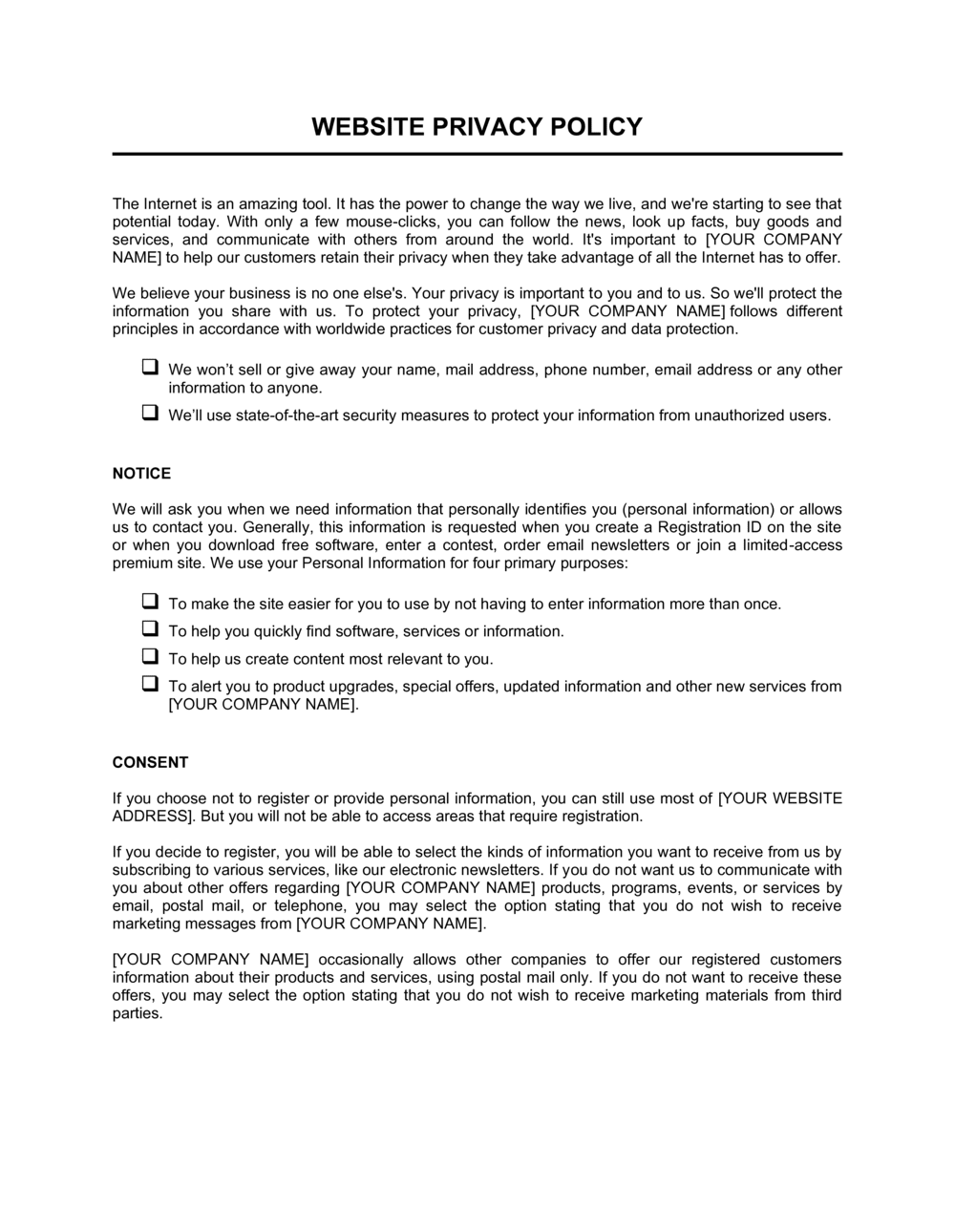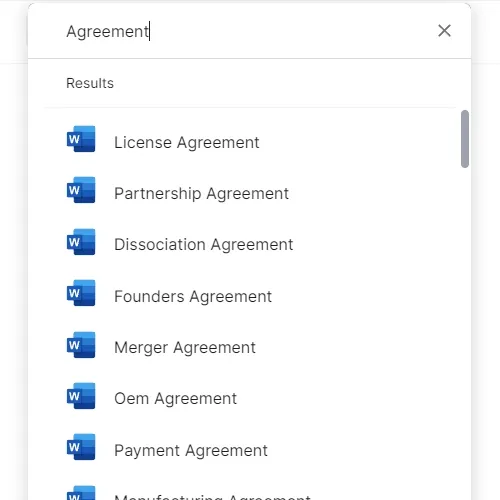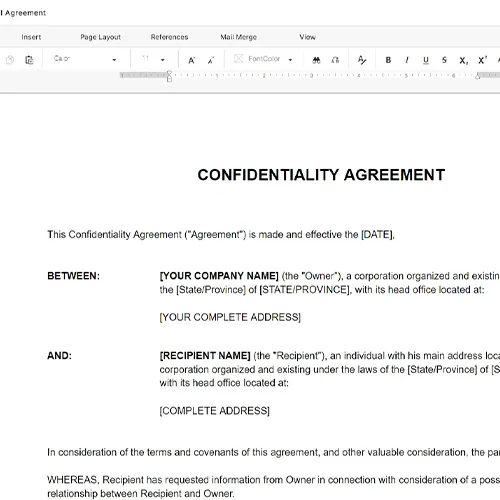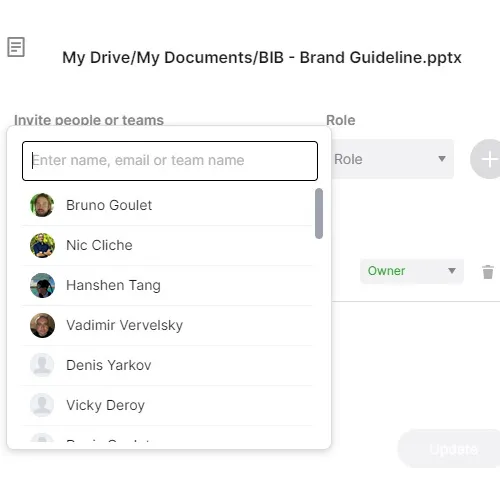Website Privacy Policy Template

Safeguarding Data with a Privacy Policy
In today's digital world, a Privacy Policy is essential for safeguarding personal data and ensuring compliance with data protection regulations. This policy provides clarity on how organizations collect, use, and protect the personal information of their customers, employees, and other stakeholders.
The Privacy Policy serves as a regulatory framework that outlines the organization's data handling practices, ensuring transparency and compliance with relevant laws. By clearly stating the type of information collected, its intended use, and the security measures in place, the policy helps build trust with customers and partners.
What is a Privacy Policy?
A Privacy Policy is a formal document that explains how an organization collects, uses, stores, and protects personal data. It outlines the rights of individuals regarding their data and details the organization's responsibilities in safeguarding this information.
Key Elements of a Privacy Policy
A comprehensive Privacy Policy should effectively address:
- Data Collection and Use - Explains the types of personal data collected, the purpose of collecting this data, and how it will be used.
- Data Storage and Security - Details where and how personal data is stored, including the security measures employed to protect it.
- Sharing and Disclosure - Outlines the circumstances under which personal data may be shared with third parties, ensuring transparency in data usage.
- Data Subject Rights - Describes the rights individuals have regarding their personal data, including access, correction, deletion, and objection.
- Cookies and Tracking Technologies - Provides information on how cookies and similar technologies are used to collect data from website visitors.
- Policy Updates and Changes - Outlines the process for updating the policy and how individuals will be informed of any changes.
Supporting Documents for Implementing a Privacy Policy
To enhance the effectiveness of a Privacy Policy, related documents can be incorporated:
- Confidentiality Agreement (Data Processing Services) - Specifies the requirements and standards for securely managing personal data shared between the organization and third-party data processors, ensuring all parties adhere to strict confidentiality measures.
- Data Security Policy - Defines the roles and responsibilities of staff in maintaining data security, outlining the practices and procedures necessary to safeguard personal data in line with the Privacy Policy.
- Data Breach Response and Notification Policy - Details the protocol for responding to data breaches, including detection, containment, and notification processes, to minimize the potential impact on affected individuals and ensure compliance with regulatory requirements.
Why Employ a Detailed Template for a Privacy Policy?
Utilizing a detailed template for drafting your Privacy Policy offers significant benefits:
- Legal Compliance - Helps ensure adherence to data protection laws, reducing the risk of regulatory penalties.
- Transparency in Data Handling - Clearly communicates data practices to individuals, fostering trust and confidence.
- Risk Mitigation - Establishes procedures for data protection and breach response, minimizing potential damage from data incidents.
- Consistency in Data Management - Provides a clear framework for managing personal data, ensuring consistent practices across the organization.
A well-structured Privacy Policy is essential for ensuring compliance with data protection laws and building trust with stakeholders. This fundamental document helps protect personal data while establishing a transparent and secure framework for data management.
Updated in May 2024
Reviewed on

Safeguarding Data with a Privacy Policy
In today's digital world, a Privacy Policy is essential for safeguarding personal data and ensuring compliance with data protection regulations. This policy provides clarity on how organizations collect, use, and protect the personal information of their customers, employees, and other stakeholders.
The Privacy Policy serves as a regulatory framework that outlines the organization's data handling practices, ensuring transparency and compliance with relevant laws. By clearly stating the type of information collected, its intended use, and the security measures in place, the policy helps build trust with customers and partners.
What is a Privacy Policy?
A Privacy Policy is a formal document that explains how an organization collects, uses, stores, and protects personal data. It outlines the rights of individuals regarding their data and details the organization's responsibilities in safeguarding this information.
Key Elements of a Privacy Policy
A comprehensive Privacy Policy should effectively address:
- Data Collection and Use - Explains the types of personal data collected, the purpose of collecting this data, and how it will be used.
- Data Storage and Security - Details where and how personal data is stored, including the security measures employed to protect it.
- Sharing and Disclosure - Outlines the circumstances under which personal data may be shared with third parties, ensuring transparency in data usage.
- Data Subject Rights - Describes the rights individuals have regarding their personal data, including access, correction, deletion, and objection.
- Cookies and Tracking Technologies - Provides information on how cookies and similar technologies are used to collect data from website visitors.
- Policy Updates and Changes - Outlines the process for updating the policy and how individuals will be informed of any changes.
Supporting Documents for Implementing a Privacy Policy
To enhance the effectiveness of a Privacy Policy, related documents can be incorporated:
- Confidentiality Agreement (Data Processing Services) - Specifies the requirements and standards for securely managing personal data shared between the organization and third-party data processors, ensuring all parties adhere to strict confidentiality measures.
- Data Security Policy - Defines the roles and responsibilities of staff in maintaining data security, outlining the practices and procedures necessary to safeguard personal data in line with the Privacy Policy.
- Data Breach Response and Notification Policy - Details the protocol for responding to data breaches, including detection, containment, and notification processes, to minimize the potential impact on affected individuals and ensure compliance with regulatory requirements.
Why Employ a Detailed Template for a Privacy Policy?
Utilizing a detailed template for drafting your Privacy Policy offers significant benefits:
- Legal Compliance - Helps ensure adherence to data protection laws, reducing the risk of regulatory penalties.
- Transparency in Data Handling - Clearly communicates data practices to individuals, fostering trust and confidence.
- Risk Mitigation - Establishes procedures for data protection and breach response, minimizing potential damage from data incidents.
- Consistency in Data Management - Provides a clear framework for managing personal data, ensuring consistent practices across the organization.
A well-structured Privacy Policy is essential for ensuring compliance with data protection laws and building trust with stakeholders. This fundamental document helps protect personal data while establishing a transparent and secure framework for data management.
Updated in May 2024
Easily Create Any Business Document You Need in Minutes.

Download or open template
Access over 3,000+ business and legal templates for any business task, project or initiative.

Edit and fill in the blanks
Customize your ready-made business document template and save it in the cloud.

Save, Share, Export, or Sign
Share your files and folders with your team. Create a space of seamless collaboration.


